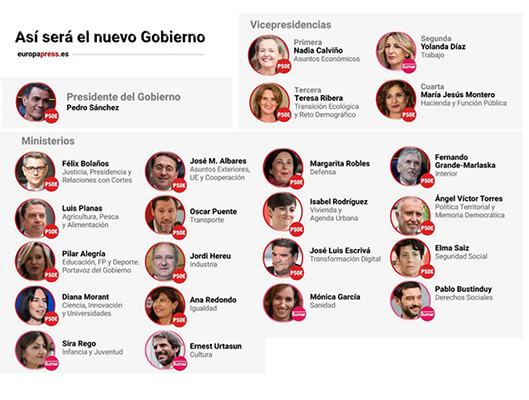Fernando González Urbaneja| Pedro Sánchez will announce his new government today, that of the 15th Legislature, which will not enjoy a single day of respite, harassed by his adversaries in the opposition and the coalition that supports him. So far, there have been five and a half years of Sánchez’s presidency over four legislatures: the 12th, which began with Rajoy’s presidency derailed by the first successful motion of censure in democracy; the failed 12th legislature; the 14th, which lasted three and a half years until the failure of the municipal and regional elections of 2023; and now the 15th, which repeats the coalition government and six pacts to reach the investiture.
Throughout these 66 months of presidency, Sánchez has used 38 ministers and six have survived the entire term of office: Defence, Economy, Finance, Interior, Ecology and Agriculture; the first four have been classified as ministers of state, a peculiar designation to give them a preferential rank.
Over these 66 months, the government has undergone seven minor reshuffles, with the exception of the new coalition government with Unidos Podemos, which brought in five ministers appointed by the latter. The departure of Pablo Iglesias was the most notable event of this phase, as it meant the displacement of Podemos and the emergence of Sumar, led by Yolanda Diaz, who became Sánchez’s new interlocutor to lead the coalition.
In conclusion, it is worth noting the consolidation of Sánchez’s power as a president adept at taking over from collaborators with command over the government and the socialist party with absolute loyalty to the president.
At the same time as this galvanisation of Sánchez’s absolute command, internal and external opposition to the new government has taken hold and will not give him a day’s respite. The direct opposition as an alternative has known three leaders in these 66 months, including the Galician Feijóo, who promises fierce opposition from the very first minute, including street demonstrations. From the outset, Sánchez has joined this opposition with two internal fronts that threaten his meagre minority, against which he has the advantage of the absence of alternatives. It is unthinkable that either Podemos or any of the nationalist formations that have given Sánchez their trust, with conditions attached, would have a better alternative than the current one. So it will be a noisy, loud and demanding internal opposition… but with no better alternative than Sánchez himself, whom they do not trust, but to whom they lack an alternative, since anyone would be worse.
There remains an additional opposition of uncertain configuration and strength, improper in a mature democracy, the so-called civil society, neither professional nor involved in political life, mobilised as on few occasions before, confronted with a vision of two opposing Spains, surprised by this confrontation, and disappointed by politics that instead of offering solutions emphasises the problems.





